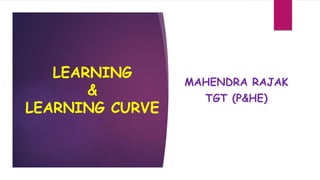T learning & learning curve
- 2. ÓżĖÓźĆÓż¢Óż©ÓżŠ LEARNING ’āś ÓżĖÓźĆÓż¢Óż©ÓżŠ Óż«ÓźīÓż£ÓźéÓż”ÓżŠ Óż£ÓźŹÓż×ÓżŠÓż© ÓżĄÓźŹÓż»ÓżĄÓż╣ÓżŠÓż░ ÓżĢÓźīÓżČÓż▓ Óż«ÓźéÓż▓ÓźŹÓż»ÓźŗÓżé Óż»ÓżŠ Óż¬ÓżĖÓżéÓż” ÓżĢÓźŗ Óż©Óż»ÓżŠ Óż»ÓżŠ ÓżĖÓżéÓżČÓźŗÓż┐Óżż ÓżĢÓż░Óż©Óźć ÓżĢÓźĆ Óż¬ÓźŹÓż░ÓżĢÓźŹÓż░Óż┐Óż»ÓżŠ Óż╣Óźł ’āś Óż╣Óż«ÓżŠÓż░Óźć ÓżĄÓźŹÓż»ÓżĄÓż╣ÓżŠÓż░ Óż«ÓźćÓżé ÓżĢÓźŗÓżł ÓżŁÓźĆ Óż¼Óż”Óż▓ÓżŠÓżĄ Óż©ÓżÅ ÓżģÓż©ÓźüÓżŁÓżĄ ÓżĢÓżŠ ÓżÅÓżĢ Óż¬Óż░Óż░ÓżŻÓżŠÓż« Óż╣Óźł Óż£Óż£ÓżĖÓźć ÓżĖÓźĆÓż¢Óż©Óźć ÓżĢÓż╣ÓżŠ Óż£ÓżŠ ÓżŠ Óż╣Óźł ’āś ÓżĖÓźĆÓż¢Óż©ÓżŠ ÓżĖÓżŁÓźĆ ÓżēÓż«ÓźŹÓż░ Óż«ÓźćÓżé Óż╣Óźŗ ÓżŠ Óż╣Óźł ÓżöÓż░ ÓżÅÓżĢ ÓżĄÓźŹÓż»Óż£Óżż ÓżĖÓźĆÓż¢ ÓżŠ Óż╣Óźł ÓżĢÓźŹÓż░ÓżĢ Óż©Óżł Óż£ÓżźÓż┐Óżż Óż«ÓźćÓżé ÓżĖÓż«ÓżØ Óż¼Óż©ÓżŠÓż©Óźć ÓżöÓż░ ÓżģÓż┐ÓżżÓżĢ ÓżåÓż░ÓżŠÓż«Óż”ÓżŠÓż»ÓżĢ Óż╣ÓźŗÓż©Óźć ÓżĢÓźć Óż▓Óż▓ÓżÅ ’āś ÓżĖÓźĆÓż¢Óż©ÓżŠ ÓżģÓż©ÓźüÓżŁÓżĄ ÓżĢÓźć Óż¬Óż░Óż░ÓżŻÓżŠÓż« ÓżźÓżĄÓż░ÓźéÓż¬ ÓżĄÓźŹÓż»ÓżĄÓż╣ÓżŠÓż░ Óż«ÓźćÓżé Óż¬Óż░Óż░ÓżĄ ÓżżÓż© Óż”ÓźŹÓżĄÓżŠÓż░ÓżŠ ÓżĄÓźŹÓż»Óżż Óż╣Óźŗ ÓżŠ Óż╣ÓźłÓżĖÓźĆÓż¢Óż©ÓżŠ ÓżÅÓżĢ ÓżåÓż£ÓźĆÓżĄÓż© ÓżÜÓż▓Óż©Óźć ÓżĄÓżŠÓż▓ÓźĆ Óż¬ÓźŹÓż░ÓżĢÓźŹÓż░Óż┐Óż»ÓżŠ Óż╣Óźł Óż£Óźŗ ÓżĄÓźŹÓż»Óż£Óżż ÓżĢÓźć Óż£Óż©ÓźŹÓż« ÓżĖÓźć Óż▓ÓźćÓżĢÓż░ Óż«ÓźāÓżżÓźŹÓż»Óźü ÓżĢ ÓżÜÓż▓ Óźć Óż░Óż╣ ÓżŠ Óż╣Óźł
- 3. LEARNING ’āś Learning is the process of acquiring new or modifying existing knowledge behaviour skill values or preference ’āś Any change in our behaviour is a result of new experience is said to be learning ’āś Learning takes place at all ages and one learns when put in a new situation to make sense and be more comfortable ’āś Learning is expressed through changes in behavior as a result of experience. Learning is a lifelong process that lasts from birth to death.
- 4. Types of Learning ’āś Motor learning ’āś Verbal learning ’āś Problem solving learning ’āś Stimulus response learning ’āś Chain learning ’āś Formal learning ’āś Informal learning
- 5. Learning Curve ’āś Óż«Óż©ÓźŗÓżĄÓźłÓż£ÓźŹÓż×ÓżŠÓżżÓż©ÓżĢ ÓżŚÓźŹÓż░ÓżŠÓż½ Óż¬ÓźćÓż¬Óż░ Óż¬Óż░ ÓżÅÓżĢ Óż░ÓźćÓż¢ÓżŠ Óż¢ÓźĆÓżéÓżÜÓżĢÓż░ ÓżĖÓźĆÓż¢Óż©Óźć ÓżĢÓźĆ Óż¬ÓźŹÓż░ÓżĢÓźŹÓż░Óż┐Óż»ÓżŠ ÓżĢÓżŠ ÓżĄÓżŻÓżżÓż© ÓżĢÓż░ Óźć Óż╣ÓźłÓżé ’āś Óż»Óż╣ Óż░ÓźćÓż¢ÓżŠ ÓżĄÓż┐ Óż╣Óźł, ÓżöÓż░ ÓżĖÓźĆÓżżÓźĆ Óż©Óż╣ÓźĆÓżé Óż╣Óźł ÓżćÓżĖÓż▓Óż▓ÓżÅ ÓżćÓżĖÓźć ÓżĖÓźĆÓż¢Óż©Óźć ÓżĢÓźĆ ÓżģÓżĄÓżźÓż┐ÓżŠ ÓżĢÓż╣ÓżŠ Óż£ÓżŠ ÓżŠ Óż╣Óźł ’āś ÓżĖÓźĆÓż¢Óż©Óźć ÓżĢÓźĆ ÓżģÓżĄÓżźÓż┐ÓżŠ ÓżĖÓźĆÓż¢Óż©Óźć ÓżĢÓźĆ Óż«ÓżŠÓżżÓźŹÓż░ÓżŠ ÓżöÓż░ ÓżĖÓźĆÓż¢Óż©Óźć Óż«ÓźćÓżé Óż▓ÓżŚÓż©Óźć ÓżĄÓżŠÓż▓Óźć ÓżĖÓż«Óż» ÓżĢÓźć Óż¼ÓźĆÓżÜ ÓżĢÓźć Óż┐ÓżÜÓżżÓźŹÓż░Óż«Óż» ÓżĖÓżéÓż¼ÓżéÓżż ÓżĢÓźŗ ÓżĖÓżéÓż”Óż▓ÓżŁÓżż ÓżĢÓż░ ÓźĆ Óż╣Óźł
- 6. Learning Curve ’āś Psychologist describe the process in learning by drawing a line on the graph paper ’āś This line is curve, and not straight so it is called learning curve ’āś learning curve refers to the graphical relationship between the amount of learning and the time is takes to learn
- 7. Óż▓Óż░ÓźŹÓż©Óż┐ÓżéÓżŚ ÓżĢÓż░ÓźŹÓżĄ Learning Curve ÓżżÓż©ÓżŠÓżżÓźŹÓż«ÓżĢ Óż▓ÓżżÓż©Óż┐ÓżéÓżŚ ÓżĢÓżĄÓżż ÓżŗÓżŻÓżŠÓżżÓźŹÓż«ÓżĢ Óż▓ÓżżÓż©Óż┐ÓżéÓżŚ ÓżĢÓżĄÓżż Óż▓Óż«Óż┐Óż┐ Óż▓ÓżżÓż©Óż┐ÓżéÓżŚ ÓżĢÓżĄÓżż Óż▓ÓżŠÓżćÓż©Óż░ Óż▓ÓżżÓż©Óż┐ÓżéÓżŚ ÓżĢÓżĄÓżż ÓżźÓż¤ÓźćÓż»Óż░ Óż▓ÓżżÓż©Óż┐ÓżéÓżŚ ÓżĢÓżĄÓżż Óż¬ÓżĀÓżŠÓż░ Óż»ÓżŠ Óż¬ÓźŹÓż▓ÓźćÓż¤Óźé
- 25. Low of Learning Primary law Law of Readiness law of Effect law of Exercise
- 26. Low of Learning Secondary law Law of Contiguity Law of Attitude Law of Belongingness Law of Similarity Law of Primary Law of Recency Law of Contrast
- 27. Law of Readiness Óż£Óż¼ ÓżĢÓźŗÓżł ÓżĄÓźŹÓż»Óż£Óżż ÓżĖÓźĆÓż¢Óż©Óźć ÓżĢÓźć Óż▓Óż▓ÓżÅ ÓźłÓż»ÓżŠÓż░ Óż╣Óźŗ ÓżŠ Óż╣Óźł ÓżöÓż░ ÓżÉÓżĖÓżŠ ÓżĢÓż░Óż©Óźć ÓżĢÓźĆ ÓżģÓż©ÓźüÓż«Óżż Óż”ÓźĆ Óż£ÓżŠ ÓźĆ Óż╣Óźł Óźŗ Óż«ÓżŠÓż«Óż▓ÓźŗÓżé ÓżĢÓźĆ ÓżĖÓżé ÓźŗÓżĘÓż£Óż©ÓżĢ Óż£ÓżźÓż┐Óżż ÓżĢÓżŠ Óż¬Óż░Óż░ÓżŻÓżŠÓż« Óż╣Óźŗ ÓżŠ Óż╣ÓźłÓźż ÓźłÓż»ÓżŠÓż░ Óż©Óż╣ÓźĆÓżé Óż╣ÓźŗÓż©Óźć Óż¬Óż░ ÓżĖÓźĆÓż¢Óż©Óźć ÓżĢÓźć Óż▓Óż▓ÓżÅ Óż«Óż£Óż¼ÓźéÓż░ Óż╣ÓźŗÓż©ÓżŠ, Óż»ÓżŠ ÓżĖÓźĆÓż¢Óż©Óźć ÓżĢÓźć Óż▓Óż▓ÓżÅ ÓźłÓż»ÓżŠÓż░ Óż╣ÓźŗÓż©Óźć ÓżĖÓźć ÓżĖÓźĆÓż¢Óż©Óźć ÓżĖÓźć Óż░ÓźŗÓżĢÓżŠ Óż£ÓżŠÓż©ÓżŠ, Óż¬Óż░Óż░ÓżŻÓżŠÓż« Óż«ÓżŠÓż«Óż▓ÓźŗÓżé ÓżĢÓźĆ ÓżÅÓżĢ ÓżĢÓżĘÓźŹÓż¤Óż¬ÓźŹÓż░Óż” Óż£ÓżźÓż┐Óżż Óż╣ÓźłÓźż
- 28. "Óż¬ÓźŹÓż░Óżż ÓżĢÓźŹÓż░Óż┐Óż»ÓżŠÓżÅÓżü Óż£Óźŗ ÓżĢÓźŹÓż░ÓżĢÓżĖÓźĆ ÓżĄÓżĄÓżČÓźćÓżĘ Óż£ÓżźÓż┐Óżż Óż«ÓźćÓżé ÓżÅÓżĢ ÓżĖÓżé ÓźŗÓżĘÓż£Óż©ÓżĢ Óż¬ÓźŹÓż░ÓżŁÓżŠÓżĄ ÓżēÓżżÓźŹÓż¬Óż©ÓźŹÓż© ÓżĢÓż░ ÓźĆ Óż╣ÓźłÓżé, ÓżēÓżĖ Óż£ÓżźÓż┐Óżż Óż«ÓźćÓżé ÓżĢÓźŹÓż░Óż½Óż░ ÓżĖÓźć Óż╣ÓźŗÓż©Óźć ÓżĢÓźĆ ÓżĖÓżéÓżŁÓżŠÓżĄÓż©ÓżŠ ÓżģÓż┐ÓżżÓżĢ Óż╣Óźŗ Óż£ÓżŠ ÓźĆ Óż╣Óźł, ÓżöÓż░ ÓżÅÓżĢ ÓżģÓżĖÓż╣Óż£ Óż¬ÓźŹÓż░ÓżŁÓżŠÓżĄ ÓżēÓżżÓźŹÓż¬Óż©ÓźŹÓż© ÓżĢÓż░Óż©Óźć ÓżĄÓżŠÓż▓ÓźĆ Óż¬ÓźŹÓż░Óżż ÓżĢÓźŹÓż░Óż┐Óż»ÓżŠÓżÅÓżé ÓżēÓżĖ Óż£ÓżźÓż┐Óżż Óż«ÓźćÓżé ÓżĢÓźŹÓż░Óż½Óż░ ÓżĖÓźć Óż╣ÓźŗÓż©Óźć ÓżĢÓźĆ ÓżĖÓżéÓżŁÓżŠÓżĄÓż©ÓżŠ ÓżĢÓż« Óż╣Óźŗ Óż£ÓżŠ ÓźĆ Óż╣ÓźłÓżéÓźż
- 29. ÓżēÓż© ÓżÜÓźĆÓż£ÓźŗÓżé ÓżĢÓźŗ ÓżĖÓż¼ÓżĖÓźć ÓżģÓż┐ÓżżÓżĢ Óż¼ÓżŠÓż░ Óż”ÓźŗÓż╣Óż░ÓżŠÓż»ÓżŠ Óż£ÓżŠ ÓżŠ Óż╣Óźł Óż£Óż£Óż©ÓźŹÓż╣ÓźćÓżé ÓżĖÓż¼ÓżĖÓźć ÓżģÓżÜÓźŹÓżøÓźĆ Óż░Óż╣ ÓżĖÓźć Óż»ÓżŠÓż” ÓżĢÓźŹÓż░ÓżĢÓż»ÓżŠ Óż£ÓżŠ ÓżŠ Óż╣ÓźłÓźż Óż»Óż╣ ÓżĪÓźŹÓż░Óż┐Óż▓ ÓżöÓż░ ÓżģÓżŁÓźŹÓż»ÓżŠÓżĖ ÓżĢÓżŠ ÓżåÓżżÓżŠÓż░ Óż╣ÓźłÓźż Óż»Óż╣ ÓżĖÓżŠÓż¼Óż¼ Óż╣Óźŗ ÓżŚÓż»ÓżŠ Óż╣Óźł ÓżĢÓźŹÓż░ÓżĢ Óż£Óż¼ ÓżĄÓżĄÓż”ÓźŹÓż»ÓżŠÓż┐ÓźĆ ÓżĖÓżŠÓż┐ÓżżÓżĢ ÓżģÓżŁÓźŹÓż»ÓżŠÓżĖ ÓżöÓż░ Óż¬ÓźüÓż©Óż░ÓżŠÓżĄÓźāÓżĄÓż┐ ÓżĢÓż░ Óźć Óż╣ÓźłÓżé Óźŗ ÓżĄÓźć ÓżĖÓż¼ÓżĖÓźć ÓżģÓżÜÓźŹÓżøÓżŠ ÓżĖÓźĆÓż¢ Óźć Óż╣ÓźłÓżé ÓżöÓż░ Óż£ÓżŠÓż©ÓżĢÓżŠÓż░ÓźĆ ÓżĢÓźŗ Óż▓ÓżéÓż¼Óźć ÓżĖÓż«Óż» ÓżĢ Óż¼Óż©ÓżŠÓżÅ Óż░Óż¢ Óźć Óż╣ÓźłÓżéÓźż Óż»Óż╣ÓżŠÓżü ÓżĢÓźüÓżé Óż£ÓźĆ Óż»Óż╣ Óż╣Óźł ÓżĢÓźŹÓż░ÓżĢ ÓżģÓżŁÓźŹÓż»ÓżŠÓżĖ ÓżĖÓżŠÓż┐ÓżżÓżĢ Óż╣ÓźŗÓż©ÓżŠ ÓżÜÓżŠÓż╣Óż╣ÓżÅÓźż Óż»Óż╣ ÓżźÓż¬ÓżĘÓźŹÓż¤ Óż╣Óźł ÓżĢÓźŹÓż░ÓżĢ ÓżģÓżŁÓźŹÓż»ÓżŠÓżĖ Óż«ÓźćÓżé ÓżĖÓźüÓżżÓżŠÓż░ ÓżŁÓźĆ Óż╣Óźŗ ÓżŠ Óż╣Óźł Óż£Óż¼ ÓżĖÓżĢÓżŠÓż░ÓżŠÓżżÓźŹÓż«ÓżĢ Óż¬ÓźŹÓż░Óżż ÓżĢÓźŹÓż░Óż┐Óż»ÓżŠ Óż╣Óźŗ ÓźĆ Óż╣Óźł
- 30. ÓżåÓżĢÓż£ÓżźÓż«ÓżĢ ÓżŠ ÓżĢÓżŠ ÓżżÓż©Óż»Óż« ÓżĖÓżéÓż¼Óż”ÓźŹÓżż ÓżĢÓż░Óż©ÓżŠ, Óż»ÓżŠ ÓżĖÓźĆÓż¢Óż©ÓżŠ, Óż”Óźŗ ÓżēÓż┐ÓźćÓż£Óż©ÓżŠ Óż»ÓżŠ ÓżÅÓżĢ ÓżĖÓżŠÓż┐ Óż╣ÓźŗÓż©Óźć ÓżĄÓżŠÓż▓ÓźĆ ÓżśÓż¤Óż©ÓżŠÓżōÓżé ÓżĢÓźŗ ÓżĖÓżéÓż”Óż▓ÓżŁÓżż ÓżĢÓż░ ÓżŠ Óż╣ÓźłÓźż Óż£Óż¼ ÓżēÓż┐ÓźćÓż£Óż©ÓżŠ ÓżöÓż░ Óż¬ÓźŹÓż░Óżż ÓżĢÓźŹÓż░Óż┐Óż»ÓżŠ ÓżÅÓżĢ ÓżĖÓżŠÓż┐ Óż╣Óźŗ ÓźĆ Óż╣Óźł, Óźŗ ÓżēÓż©ÓźŹÓż╣ÓźćÓżé ÓżēÓż©ÓżĢÓźć ÓżåÓżĢÓż£ÓżźÓż«ÓżĢ ÓżŠ ÓżĢÓźć ÓżĖÓżéÓż¼ÓżéÓżż ÓżĢÓźć ÓżĢÓżŠÓż░ÓżŻ ÓżĖÓźĆÓż¢ÓżŠ Óż£ÓżŠ ÓżŠ Óż╣ÓźłÓźż
- 31. Thanku you






























